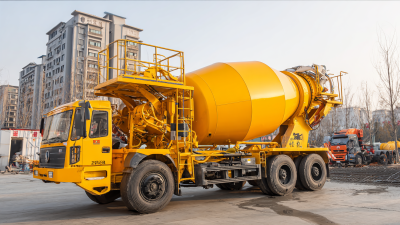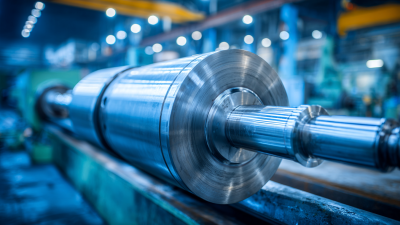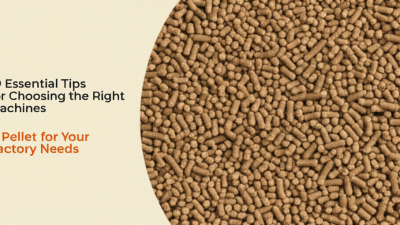Innovative Solutions for Enhancing Concrete Mixer Shaft Durability and Performance
Table of Contents
- Innovative Materials and Coatings for Concrete Mixer Shafts
- Advanced Testing Methods for Assessing Shaft Durability
- Design Enhancements for Improved Performance and Longevity
- Cost-Effective Maintenance Strategies for Mixer Shafts
- Impact of Environmental Conditions on Shaft Durability
- Emerging Technologies in Concrete Mixer Shaft Manufacturing
- FAQS
- Conclusion
- Related Posts
The durability and performance of the Concrete Mixer Shaft are critical factors influencing the efficiency and longevity of construction machinery. According to industry reports, inadequate shaft longevity can lead to increased maintenance costs, downtime, and the need for frequent replacements, adversely impacting operational productivity. As the construction sector continues to grow, with a projected market value exceeding $10 trillion by 2030, the demand for innovative solutions to enhance equipment durability is paramount.

Shanghai Zhengyi Machinery Engineering Technology Manufacturing Co., Ltd. (CPSHZY), with over 25 years of experience in manufacturing feed processing machinery and providing environmental protection systems, recognizes the significance of robust components in machinery. We aim to integrate advanced materials and innovative design methodologies to improve Concrete Mixer Shaft resilience and efficiency, ensuring our clients benefit from enhanced operational reliability and reduced lifecycle costs.
Innovative Materials and Coatings for Concrete Mixer Shafts
The durability and performance of concrete mixer shafts are critical factors in maintaining the efficiency of construction operations. Recent advancements in innovative materials and coatings have paved the way for significant improvements in these components. According to a report by the American Concrete Institute, concrete mixer shafts experience wear rates that can exceed 20% per year under extreme conditions, leading to frequent replacements and increased operational costs. Utilizing advanced steel alloys and composite materials can substantially enhance resistance to abrasion and corrosion, effectively extending the lifespan of the shafts.
Additionally, the application of high-performance coatings, such as ceramic and polymer-based solutions, can further bolster the durability of concrete mixer shafts. These coatings provide a protective barrier, significantly reducing wear and tear from the harsh cement mixing environment. A study from the Journal of Materials in Civil Engineering highlighted that shafts treated with advanced coatings exhibited up to a 50% improvement in wear resistance compared to untreated versions. As the construction industry continues to strive for efficiency and sustainability, these innovative materials and coatings will play a vital role in enhancing not only the performance but also the economic viability of concrete mixing operations.
Durability and Performance of Innovative Materials for Concrete Mixer Shafts
Advanced Testing Methods for Assessing Shaft Durability
Advanced testing methods are crucial for assessing the durability of concrete mixer shafts, especially given the mechanical demands faced in industrial settings. These innovative procedures can provide invaluable insights into the materials and designs that can enhance the longevity and performance of these critical components. By employing approaches such as non-destructive testing, fatigue analysis, and wear simulations, manufacturers can identify potential weaknesses in shaft design and materials before they lead to failures.

At Shanghai Zhengyi Machinery Engineering Technology Manufacturing Co., Ltd., we leverage our extensive experience in manufacturing robust feed processing machinery to develop durable solutions for concrete mixer shafts. Utilizing advanced testing methods, we ensure that our products meet the highest standards of performance and reliability. Our commitment to innovation not only serves our feed plant and aquaculture farm clients but also extends into providing enhanced durability solutions for various industrial applications, thus driving efficiency and reducing operational downtime.
Design Enhancements for Improved Performance and Longevity
The advancements in the design of concrete mixer shafts are pivotal for enhancing their durability and overall performance. In industries relying heavily on concrete production, the longevity of mixer components directly correlates with operational efficiency and cost-effectiveness. Recent reports indicate that the global concrete mixer market is projected to grow significantly, driven by an increasing demand for durable machinery that can withstand rigorous operational conditions. By implementing design enhancements that focus on improving the material properties and structural integrity of mixer shafts, manufacturers can notably elevate their performance metrics.
Innovations such as composite liners and advanced metal alloys are being explored to provide superior resistance to wear and environmental degradation. For instance, the introduction of biomimetic materials — inspired by nature’s design strategies — is gaining traction in the industry. These materials demonstrate remarkable improvements in performance characteristics, including higher resistance to abrasion and extended service life. According to market analysis, the demand for high-performance concrete mixers is expected to expand, creating opportunities for emerging technologies that can further optimize operational capabilities. As industries move towards smarter and more sustainable solutions, enhancing mixer shaft durability through revolutionary design will be a critical factor in meeting future construction demands.
Cost-Effective Maintenance Strategies for Mixer Shafts
In the quest for optimal performance in construction equipment, particularly concrete mixers, implementing cost-effective maintenance strategies is vital for enhancing the durability of mixer shafts. Regular inspections and scheduled maintenance can significantly reduce the likelihood of breakdowns and prolong the lifespan of mixer shafts. Simple yet effective practices such as lubrication checks, alignment adjustments, and the replacement of worn-out components can lead to substantial savings, not only in repair costs but also in minimizing downtime.
Moreover, innovative materials and coatings can further boost the durability of mixer shafts. The application of advanced surface treatments can protect against wear and corrosion, ensuring that the mixer operates efficiently under various conditions. The integration of smart technology, such as sensors to monitor the operational status and health of the mixer shafts, can offer real-time data for proactive maintenance. This analytical approach allows operators to address potential issues before they escalate, ensuring consistent performance and extending the service life of the equipment while adhering to budget constraints.
Impact of Environmental Conditions on Shaft Durability
When it comes to concrete mixers, the durability and performance of the mixer shaft are critical factors that can greatly impact operational efficiency. One of the most significant influences on shaft durability is the environmental conditions under which the equipment operates. Harsh weather, temperature fluctuations, and exposure to chemical agents can lead to accelerated wear and tear on the mixer shaft, ultimately affecting its performance and lifespan.
To mitigate the impact of these environmental factors, it is essential to incorporate innovative solutions such as advanced materials that offer better corrosion resistance and thermal stability. Additionally, regular maintenance schedules should be implemented to inspect and service the mixer shaft, particularly before seasonal changes.
**Tips:** Consider using protective coatings or linings on the mixer shaft to shield it from environmental damages. Choosing a mixer model designed for extreme conditions can also enhance durability. Lastly, training operators to recognize signs of shaft degradation can help in early detection and prevention of severe issues.
Innovative Solutions for Enhancing Concrete Mixer Shaft Durability and Performance - Impact of Environmental Conditions on Shaft Durability
| Environmental Condition | Shaft Material | Average Durability (Years) | Performance Rating (1-10) | Maintenance Frequency (Months) |
|---|---|---|---|---|
| High Humidity | Stainless Steel | 5 | 8 | 6 |
| Extreme Heat | Carbon Steel | 3 | 6 | 4 |
| Cold Conditions | Alloy Steel | 4 | 7 | 5 |
| Dusty Environment | High-Carbon Steel | 6 | 9 | 8 |
| Saline Conditions | Corrosion-Resistant Alloy | 7 | 10 | 12 |
Emerging Technologies in Concrete Mixer Shaft Manufacturing
The manufacturing of concrete mixer shafts has undergone significant advancements, driven by the need for enhanced durability and performance. Emerging technologies, such as advanced alloy compositions and innovative coating techniques, are now being utilized to improve the resistance of shafts to wear and corrosion. For instance, the introduction of high-strength steel alloys ensures that mixer shafts can withstand the demanding conditions of mixing operations, including abrasive materials and extreme mechanical stress.
Additionally, additive manufacturing, or 3D printing, is revolutionizing the way concrete mixer shafts are produced. This technology allows for the creation of complex geometries that improve fluid dynamics within the mixer, resulting in better blending efficiency. Moreover, the precision of 3D printing reduces material waste and enables rapid prototyping, allowing manufacturers to test new designs quickly and effectively. As these technologies continue to evolve, they are set to redefine the standards for concrete mixer shaft durability and performance in the industry.

FAQS
: Recent advancements include the use of composite liners and advanced metal alloys to improve resistance to wear and environmental degradation, as well as the introduction of biomimetic materials that enhance performance characteristics.
The durability of mixer components directly correlates with operational efficiency and cost-effectiveness, impacting the overall performance of concrete production.
Harsh weather, temperature fluctuations, and exposure to chemical agents can lead to accelerated wear and tear on the mixer shaft, affecting its performance and lifespan.
Advanced materials that offer better corrosion resistance and thermal stability, such as composite materials and biomimetic materials, are suggested to improve durability.
Incorporating protective coatings or linings, using models designed for extreme conditions, and implementing regular maintenance schedules can help mitigate environmental impacts.
The demand is expected to increase as industries look for durable machinery that can withstand rigorous operational conditions and optimize operational capabilities.
Operators can be trained to recognize signs of shaft degradation, allowing for early detection and prevention of severe issues.
Design enhancements focused on improving material properties and structural integrity can notably elevate the performance metrics of concrete mixers, meeting future construction demands.
The market is projected to grow significantly due to increasing demand for durable machinery, driven by advancements in design and technology.
Smarter and more sustainable solutions can lead to enhanced durability, improved operational capabilities, and reduced environmental impact in concrete production processes.
Conclusion
The article "Innovative Solutions for Enhancing Concrete Mixer Shaft Durability and Performance" explores a range of advanced approaches aimed at improving the longevity and efficiency of Concrete Mixer Shafts. It highlights innovative materials and coatings that can significantly enhance the durability of shafts, alongside advanced testing methods that provide insights into their performance under various conditions. The discussion includes design enhancements that bolster performance, cost-effective maintenance strategies, and the impact of environmental factors on shaft integrity. Additionally, the article addresses emerging technologies in manufacturing processes, positioning these advancements as essential for optimizing the operational lifespan of Concrete Mixer Shafts.
At Shanghai Zhengyi Machinery Engineering Technology Manufacturing Co., Ltd., our expertise in producing robust machinery solutions complements these innovations. With over 25 years of experience in manufacturing feed processing machinery, we understand the critical importance of durable components for high-performance operations, including Concrete Mixer Shafts. By integrating these innovative strategies, we aim to enhance the overall efficiency and sustainability of our products in the increasingly competitive market.
Related Posts
-

Essential Guide to Maximizing Efficiency with Vertical Shaft Cement Mixers Checklist
-

Why Choosing Horizontal Shaft Concrete Mixers Can Transform Your Construction Projects
-

Understanding Die Steel Variants for Optimal Industrial Applications
-

Understanding the Essential Role of Concrete Mixer Shafts in Construction Efficiency and Durability
-

Advantages of Utilizing a Drum Mixer Shaft in Your Production Process
-

10 Essential Tips for Choosing the Right Machines A Pellet for Your Factory Needs
Blog Tags:

